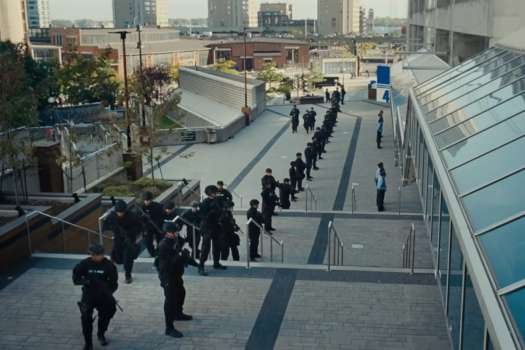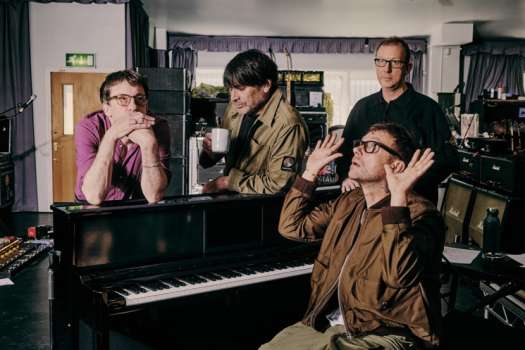His ship of fleeting celebrity long sailed, ex-Britpop guitarist Lachlan MacAldonich (Robert Carlyle) spends his days in the titular California, working on a farm, routinely getting drunk and selling produce at a local farmer's market. Initially, he seems content with his lifestyle, bonding with his employer and sole friend, Warren (A Martinez), when not getting plastered at a nearby watering hole.
But, as is the case with anyone living in isolation as a means of avoidance and self-preservation, a DUI forces Lachlan to confront his past when a prior drug conviction threatens his green card status in the U.S.
Likely to be deported unless he is able to establish that his absence would result in extreme hardship for a permanent citizen, he dives into a downward spiral of introspection and self-loathing, tenuously reaching back into the past he left behind to avoid being shipped back to the UK, where the death of his bandmate, and brother, looms.
Marshall Lewy's approach to this story is minimalist; he allows Carlyle to dig his teeth into his drunken loser of a character without stylistic interference or even any genuine concern of the resulting pacing or narrative issues. As such, it's fascinating to watch Lachlan defend his identity and ego against past mistakes he refuses to acknowledge and verbalize, instead breaking down psychologically when forced to reach out to old friends for money or a daughter (Savannah Lathem) he's not been in contact with.
How he's perceived by the world is mirrored by his relationship with Beau (Alexia Rasmussen), an attractive younger customer at the farmer's market, and her Britpop-obsessed boyfriend, Paul (Danny Masterson). Initially, the pair is enamoured with his "no bullshit" attitude and past successes, but after their buzz wears off and Lachlan keeps partying, their awe quickly turns to pity.
The major issue with California Solo, and Lewy's thoughtful style, is that Lachlan's isolationist disposition limits the potential of the narrative. All the secondary characters merely act as moral ciphers to reveal our protagonist's inner-struggles, making for a very focused and increasingly draining viewing.
As much as Carlyle is impressive to watch, it's hard not to think about how much more effective it would have been if the world around his character was given a bit more detail and thought.
Of course, simultaneously, Lachlan's propensity for merely using everyone around him to suit his needs suggests that this perspective might reflect the psychology of the character. However, it doesn't make for compelling cinema.
(Kinosmith)But, as is the case with anyone living in isolation as a means of avoidance and self-preservation, a DUI forces Lachlan to confront his past when a prior drug conviction threatens his green card status in the U.S.
Likely to be deported unless he is able to establish that his absence would result in extreme hardship for a permanent citizen, he dives into a downward spiral of introspection and self-loathing, tenuously reaching back into the past he left behind to avoid being shipped back to the UK, where the death of his bandmate, and brother, looms.
Marshall Lewy's approach to this story is minimalist; he allows Carlyle to dig his teeth into his drunken loser of a character without stylistic interference or even any genuine concern of the resulting pacing or narrative issues. As such, it's fascinating to watch Lachlan defend his identity and ego against past mistakes he refuses to acknowledge and verbalize, instead breaking down psychologically when forced to reach out to old friends for money or a daughter (Savannah Lathem) he's not been in contact with.
How he's perceived by the world is mirrored by his relationship with Beau (Alexia Rasmussen), an attractive younger customer at the farmer's market, and her Britpop-obsessed boyfriend, Paul (Danny Masterson). Initially, the pair is enamoured with his "no bullshit" attitude and past successes, but after their buzz wears off and Lachlan keeps partying, their awe quickly turns to pity.
The major issue with California Solo, and Lewy's thoughtful style, is that Lachlan's isolationist disposition limits the potential of the narrative. All the secondary characters merely act as moral ciphers to reveal our protagonist's inner-struggles, making for a very focused and increasingly draining viewing.
As much as Carlyle is impressive to watch, it's hard not to think about how much more effective it would have been if the world around his character was given a bit more detail and thought.
Of course, simultaneously, Lachlan's propensity for merely using everyone around him to suit his needs suggests that this perspective might reflect the psychology of the character. However, it doesn't make for compelling cinema.




